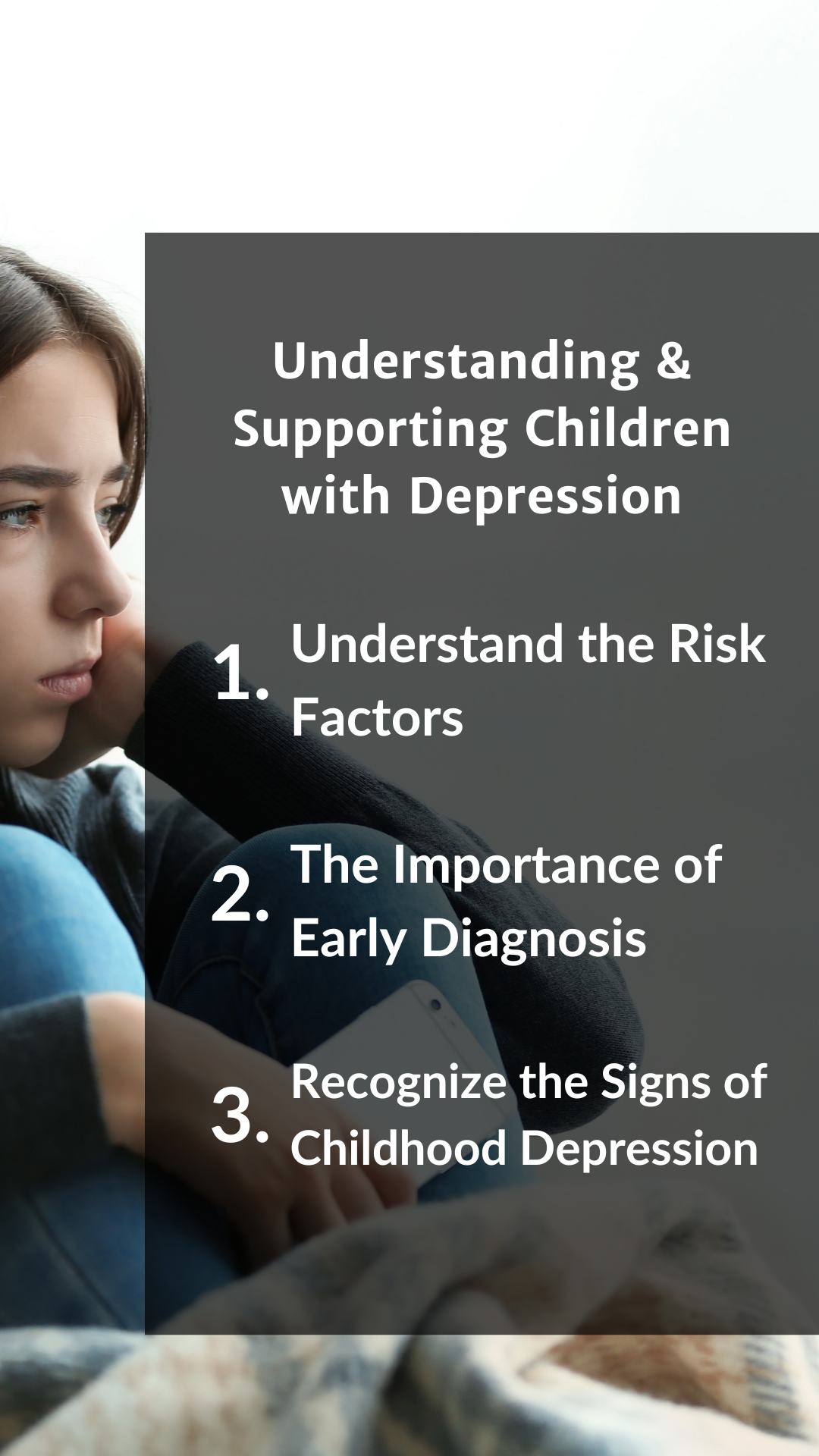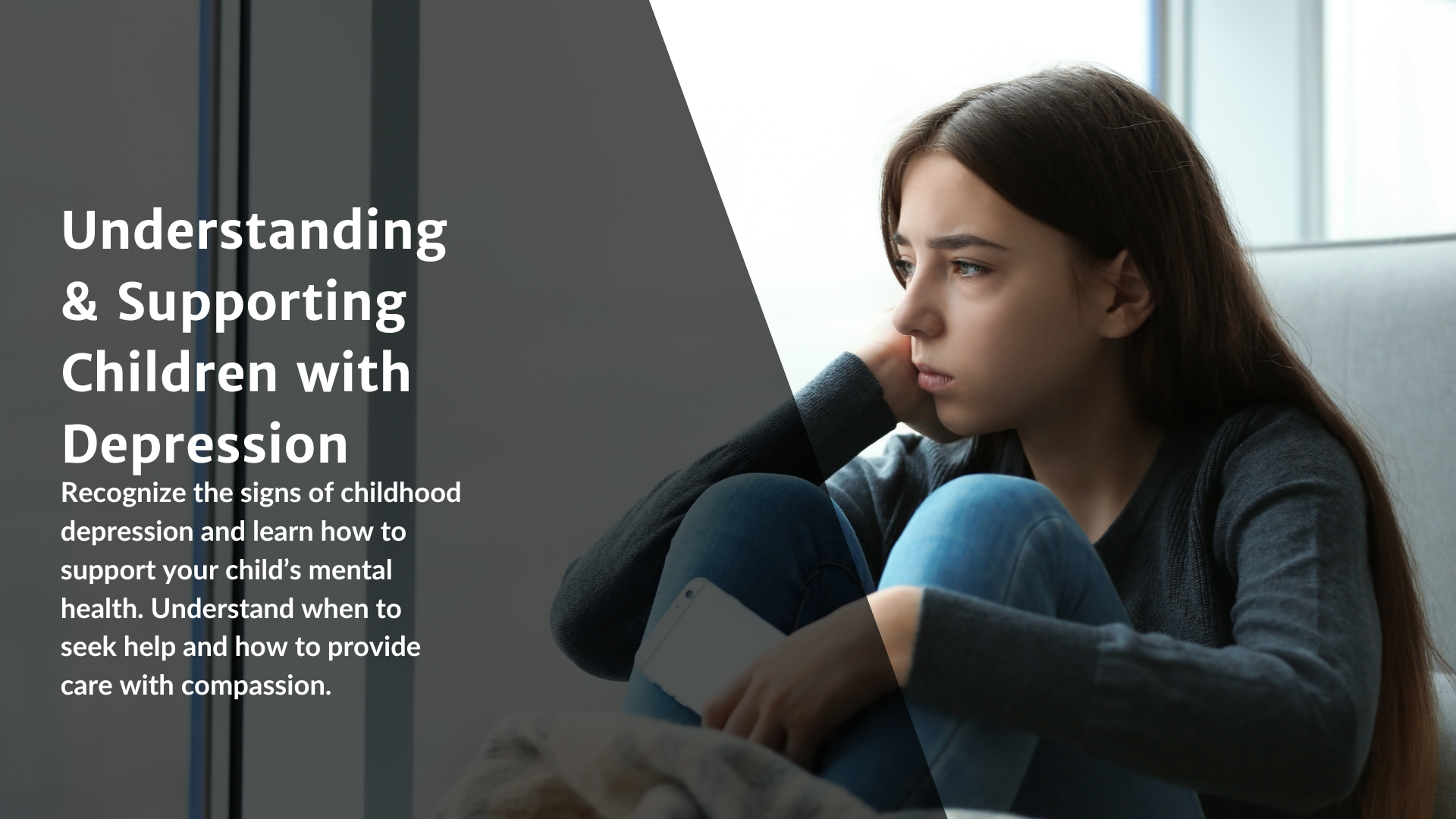What if a child’s sadness is more than just a rough day? Children can experience depression just like adults, but the signs often show up differently in young people. Identifying childhood depression early and knowing how to guide your child through it is crucial for their emotional health. In this article, we’ll discuss the key symptoms of childhood depression, when to reach out for professional support, and the best ways to help them achieve a brighter emotional future.
What is Childhood Depression?
Childhood depression is a mental health condition that affects how a child feels, thinks, and behaves. Unlike occasional sadness, childhood depression is more persistent and can interfere with a child’s daily life, including school, friendships, and family activities. It may present differently than adult depression, often showing up as irritability, anger, or withdrawal rather than sadness.
Recognizing the Signs of Childhood Depression
Depression in children can look different from depression in adults. It’s important to be aware of both the emotional and behavioral signs that may indicate your child is struggling. Some common signs of childhood depression include:
- Irritability or Anger: Unlike adults, children may not express sadness directly. Instead, they may become easily frustrated, irritable, or angry, even over small issues.
- Withdrawal from Friends and Activities: A child experiencing depression might pull away from activities they used to love, like spending time with friends, playing sports, or even enjoying their favorite hobbies.
- Changes in Sleep Patterns: Depression can affect sleep, causing a child to sleep too much or too little. You might notice your child struggling to fall asleep or staying in bed for extended periods.
- Fatigue or Low Energy: A noticeable lack of energy, even after sufficient rest, can be a sign of depression. Your child may seem lethargic or unwilling to engage in daily activities.
- Feelings of Worthlessness or Guilt: Children may express negative self-talk, such as saying they are “no good” or that everything is their fault. These feelings of guilt or worthlessness are strong indicators of childhood depression.
- Difficulty Concentrating: A child experiencing depression may have trouble focusing at school, leading to a decline in academic performance. Teachers might also notice changes in behavior or participation.
When Does Depression Become a Clinical Concern?
It can be difficult to distinguish between occasional sadness and clinical depression, especially in children. So, how do you know when to seek professional help? Depression becomes a clinical concern when the symptoms persist for weeks or even months and begin to interfere with your child’s daily life.
In some cases, childhood depression may be triggered by specific events, such as the loss of a loved one, bullying, or family stress. However, depression can also develop without a clear cause. If your child’s symptoms persist or worsen, consulting a mental health professional for a proper diagnosis is critical.
Child mental health professionals can assess the severity of depression and recommend appropriate treatment, which may include therapy, lifestyle changes, or, in some cases, medication.
Understanding the Risk Factors for Childhood Depression
Several factors can increase a child’s risk of developing depression. While no single cause explains childhood depression, a combination of genetic, environmental, and psychological factors often contributes to its onset.
Some of the common risk factors include:
- Family History: Children with a family history of depression or other mental health disorders are more likely to develop depression themselves.
- Chronic Stress or Trauma: Ongoing stress, such as family conflict, financial instability, or school-related pressures, can contribute to depression in children. Additionally, traumatic experiences like abuse, neglect, or the loss of a loved one can trigger depressive symptoms.
- Bullying or Social Isolation: Social challenges, including bullying or being excluded by peers, can negatively impact a child’s mental health, leading to feelings of loneliness and sadness.
- Chronic Illness: Children dealing with long-term medical conditions may be at a higher risk for depression due to the physical and emotional toll of their illness.
The Importance of Early Diagnosis and Treatment
The sooner childhood depression is diagnosed, the better the chances of successful treatment. If left untreated, depression can worsen over time and have long-lasting effects on a child’s mental health and development. That’s why it’s so important to seek help when symptoms persist or worsen.
Therapy is often a key component of treatment for childhood depression. A mental health professional can work with your child to identify underlying issues and help them develop healthy coping mechanisms. Cognitive behavioral therapy (CBT) is a common therapeutic approach for depression, teaching children how to challenge negative thought patterns and manage their emotions more effectively.
In some cases, medication may be prescribed, but this is typically considered only when therapy alone is not sufficient. The treatment plan will vary depending on the severity of your child’s depression and their individual needs.
How to Support a Child with Depression
As a parent or caregiver, your role in supporting a child with depression is invaluable. While professional treatment is essential, there are several ways you can help at home:
- Encourage Open Communication: Let your child know it’s okay to share what they’re feeling. Creating a safe, non-judgmental environment where your child can express themselves is crucial to their mental health.
- Validate Their Feelings: Avoid dismissing or minimizing your child’s emotions. Instead, validate their feelings by acknowledging that what they’re going through is difficult, but they are not alone.
- Promote Routine and Stability: Children thrive on structure, and maintaining regular routines for meals, sleep, and activities can help provide a sense of stability during challenging times.
- Be Patient and Compassionate: Recovery from depression takes time, and your child may have good days and bad days. Be patient and show compassion even when things feel difficult.
Conclusion: Prioritizing Child Mental Health
Childhood depression is a serious condition, but with the right support and treatment, children can overcome it and thrive. As a parent or caregiver, your attentiveness to their emotional well-being and willingness to seek help when needed can make all the difference.
At Mente Counseling, we specialize in helping children navigate the challenges of depression with care and compassion. Our team of mental health professionals is here to provide the therapy and support your child needs. Connect with us today to discover how we can support your child’s journey toward emotional well-being.
FAQs
How to tell if a child is depressed?
What age does depression show up in kids?
What activities help kids with depression?
What are the symptoms of depression in a child?

